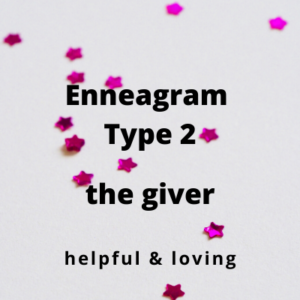Enneagram Type 2: The Giver
Curious to know what an Enneagram Type 2 actually means? Continue reading this post to find out!
A form of personality typing, the Enneagram describes patterns in how a person manages his emotions and how he sees the world. It comes from the Greek words Ennea that means nine and Gramma which means something written or drawn.
The Enneagram model has nine different personality types. These types are then mapped on a nine-point diagram to see how each of them relate to each other.
By this method, it’s believed that you can better understand why a person behaves in a certain way. And, by knowing how a person may react to some situations, the model can be used for opportunities for self-improvement.
Enneagram Type 2: Defining Traits
Of the nine possible types in the Enneagram, type two is best described by the nickname ‘The Giver”. Below are some of its notable characteristics:
- Helpful and loving
- Has smooth and flowing movements
- Is patient and nurturing
- Gentle and caring
- A great team player
- An activist and someone who always speak their mind
- Kind and approachable
- Has warm eyes and smile
Enneagram Type 2: What are they Like?
Givers are caring and empathetic people who put the needs of others before theirs. They easily sense the emotions of others and are always there to show support and comfort them.
They always make themselves available and can be seen as a shoulder to cry on or as a source of encouragement. They’re the ones you can depend on through thick or thin.
Moreover, Givers are often open and popular and are liked by everyone. They’re supportive and encouraging that’s why they easily attract people in any stage of their lives.
Their Core Values
If there are two words to describe Givers, they are empathetic and emotional. Altruism is a big part of their lives, too, and they readily go out of their way to cheer others up.
Their decisions are guided by kindness and reciprocity.
Givers feel several times better knowing they’ve improved someone else’s mood. Furthermore, they find extreme happiness in spending quality time with their loved ones.
How to recognize the enneagram type 2?
Since they’re approachable, Givers are the people strangers are first drawn to for directions or advice. They’re also very aware of the needs of others and are often seen as the ‘father’ or “mother” of their social groups.
The Givers are usually those who continually make an effort to stay connected with their loved ones. They enjoy putting a smile on other’s faces and are highly attuned to their love languages.
Whether it’s by giving gifts, cooking homemade meals, etc.
Enneagram Type 2: What They’re Like at Different Levels
Normal Level
Givers are selfless people who give unconditional love. They freely share their own needs with others, too, and secure a healthy give-and-take relationship with them.
They can develop close connections with others and understand when they need space. They also know their own worth and can help others find theirs.
Moderate Level
Givers are often seen as the ‘martyrs’ in relationships. Moreover, they make themselves feel important by always attending to the needs of others.
The enneagram type 2 likes it when others constantly remind them how lucky they are to have them in their lives—and work hard to keep this image of the accessible friend. However, this leads them to ‘burnout’ easily.
They also flatter or give others compliments to gain appreciation and acceptance and they need to have the approval of others, especially of their loved ones.
Extreme Level
At unhealthy levels, Givers can repeatedly look for mistakes in the work of others. They may try to gain control over their relationships and become too overbearing and clingy.
Because of their ‘dependable’ image, they can make it look like you’re the problem and play the victim to gain sympathy.
Givers can be manipulative and blame others for their misery. If they’re criticized, especially by those they’ve helped, they’ll be in deep despair and develop various kinds of physical illnesses such as nausea, fever, and body aches.
